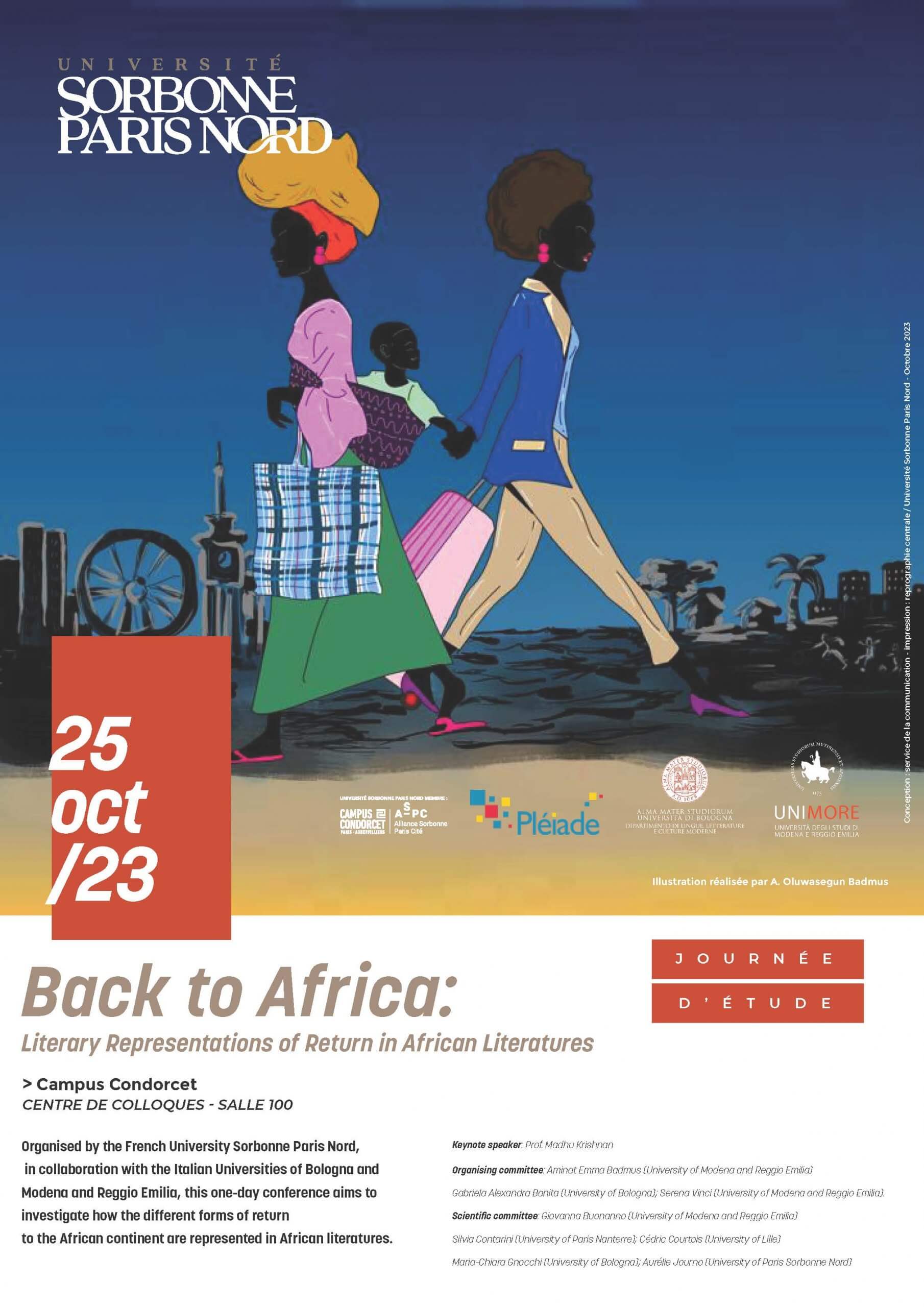The French University Sorbonne Paris Nord, in collaboration with the Italian University of Bologna and the University of Modena and Reggio Emilia, is organising a one-day International Conference devoted to postgraduate students and early researchers on the topos of return in African literatures.
Context
After years spent in the USA as a migrant, Ifemelu, the protagonist of Chimamanda Ngozi Adichie’s Americanah (2013), realises that her home country, Nigeria, “became where she was supposed to be, the only place she could sink her roots in without the constant urge to tug them out and shake off the soil.” This “gravitational pull,” as Maximilian Feldner (2019) calls it, has been perceptible in African literatures throughout the years so much so as to represent one of its constitutive features.
In the still ongoing “age of the refugee, the displaced person, mass migration” (Said 1984), the need to return found in African Literatures seems, at first glance, to be at odds with the postcolonial debates around hybridity, cosmopolitanism, and rootlessness or route-oriented belonging. As Salman Rushdie (1983) declared, “roots […] are a conservative myth, designed to keep us in our places.” On a similar note, drawing from the Igbo knowledge system, Chinua Achebe (1994) employs the concept of rootlessness as a metaphor for writing: “If you’re rooted to a spot, you miss a lot of the grace. So you keep moving, and this is the way I think the world’s stories should be told — from many different perspectives,” he argued. Thus, how can return be tackled without mooring it to discourses imbued with essentialism, nationalism, and exclusion, all of which could potentially be derived from rootedness?
Perhaps, however, it is the very tension between routes and roots that should be overcome. It is what James Clifford (1997) attempted to do in his work Routes: Travels and Translation in the Late Twentieth Century. With the return, the homonymic opposition is resolved because coming back to one’s roots involves the act of travelling – routes. But can one ever come back home? As beautifully shown by the novel On Black Sisters’ Street (2011), originally written in Dutch by Nigerian writer Chika Unigwe, migrants, while abroad, might experience a kind of nostalgia. After their return, however, this nostalgia might morph into disillusion and even alienation, as shown by Obi, the protagonist of Chinua Achebe’s No Longer at Ease (1960).
Also, it is important to underline that people who come back are not the same as when they left: after having had to adapt to different – and sometimes hostile – environments and socio-cultural systems, returnees might face the same difficulty seen during the initial migration as they are reintegrating into their home country. The eponymous character of Kehinde (1994) by Buchi Emecheta, is precisely an example of such discomfort: once she comes back to Nigeria, she is forced into a polygamous relationship she struggles to accept after her husband decides to marry a second, younger woman in secret.
The return can either convey a sense of agency when triggered by the desire or need to escape from the racism and injustices of the host country, as in Sefi Atta’s A Bit of Difference (2012), or, on the contrary, a failure when it is imposed by the authorities of the host country as in Helon Habila’s Travellers (2019).
Drawing on all these issues, the conference aims to analyse how the phenomenon of return migration has been addressed and continues to be addressed in African Literatures. Indeed, while in migration studies, from the 1990s onwards, there has been a growing interest in return migration and the ways in which it shapes individuals in terms of identity changes and cultural shifts (King and Kuschminder 2022), the same cannot be said for literary criticism. While early migration studies conducted on return mobilities tended to offer a simplistic view of such phenomena (i.e., migrants moved from their native country to the place of destination and stayed for good or decided to return back after a while), today’s mobilities paradigm is way more complex and intricate. This complexity is mirrored in the recurrent topos of return in African literatures, which has taken multiple forms: from permanent reverse migration to brief “reconnections”, i.e., provisional returns (Knudsen and Rahbek 2019) or what is perceived as a return to an ancestral land by U.S. descendants of enslaved people, as in Ghanaian-American writer Yaa Gyasi’s Homegoing (2016).
Ideas of return, whether implemented or only intentional, re-emerge in different historical periods and places across the African continent: from Kwamankra, the protagonist of Ethiopia Unbound (1911) by Fante writer J. E. Casely Hayford, which might be the first fictional work dealing with return from the so-called mother-country, to the omnipresent figure of what in the Anglophone post-independent period was called the “been-to” i.e. a member of the elite, generally male, who undertook a period of study abroad and returned to contribute to the building of the newly sovereign states. This is the case of Baako, the protagonist of Fragments (1970) by Ghanaian writer Ayi Kwei Armah. Similar figures can also be observed in the francophone context in works such as Climbié (1956) by Ivorian writer Bernard Binlin Dadié or L’Aventure ambiguë (1971) by Senegalese writer Cheikh Hamidou Kane.
Today, more than ever, characters who return abound in African literatures: Nina in Loin de mon père (2010) by Franco-Ivorian writer Véronique Tadjo,Ike, the anti-hero of Foreign Gods, Inc. (2014) by Nigerian writer Okey Ndibe and Christine, one of the characters of Tropical Fish: Stories Out of Entebbe (2006) by Ugandan writer Doreen Baingana, to cite only a few examples. Like their authors, these returnees are part of a transnational context and straddle multiple nations in a way that not only makes them overcome the dichotomy between home and host country but also negotiate and redefine the meaning of “home”.
Aim
This one-day conference aims to investigate how the different forms of return to the African continent are represented in African literatures. We hope to welcome a wide variety of contributions from postgraduate and early-career researchers that do not exclusively focus on the Global North – Global South axis but also on infra-continental patterns of migration as well as understudied migratory axes within the Global South. While, for pragmatic reasons, contributions will be delivered in English, we hope they will tackle narratives of return from different African countries and in a variety of languages, both local and national.
Individual or joint papers will be allotted 20 minutes, followed by a discussion at the end of each panel.
Themes and sub-themes:
- Reverse Migration in African and African Diasporic Literatures;
- Intra-continental African migration and return;
- Stylistic features of the narratives of return;
- Themes foregrounded by the narratives of return;
- Different temporalities of the return: from personal to inter-generational return;
- The role of the theme of return in shaping African Literatures;
- The ancestral return and the search for one’s origin;
- The evolution of the figure of the “returnee” and its narrative(s): gender and genres (travelogue, historical novel, family saga etc.) of the return;
- The impossibility of return;
- Editorial challenges and opportunities of writing about the return;
- Metaphorical return;
- …


